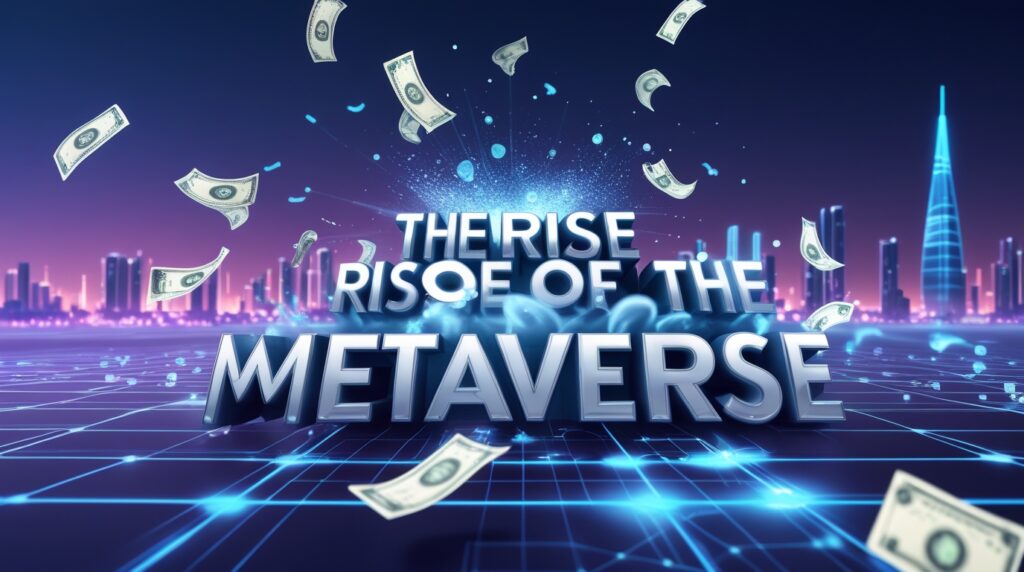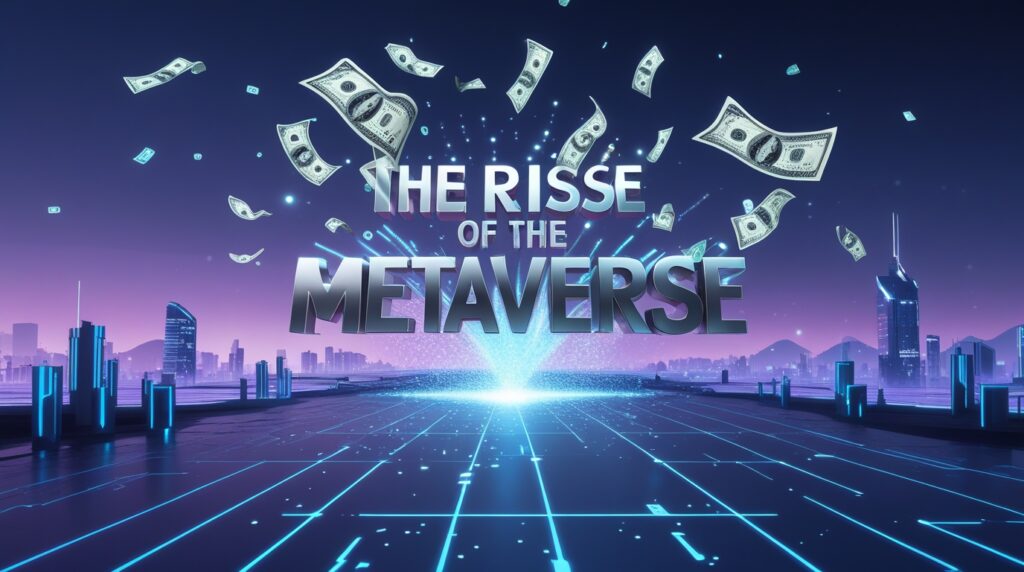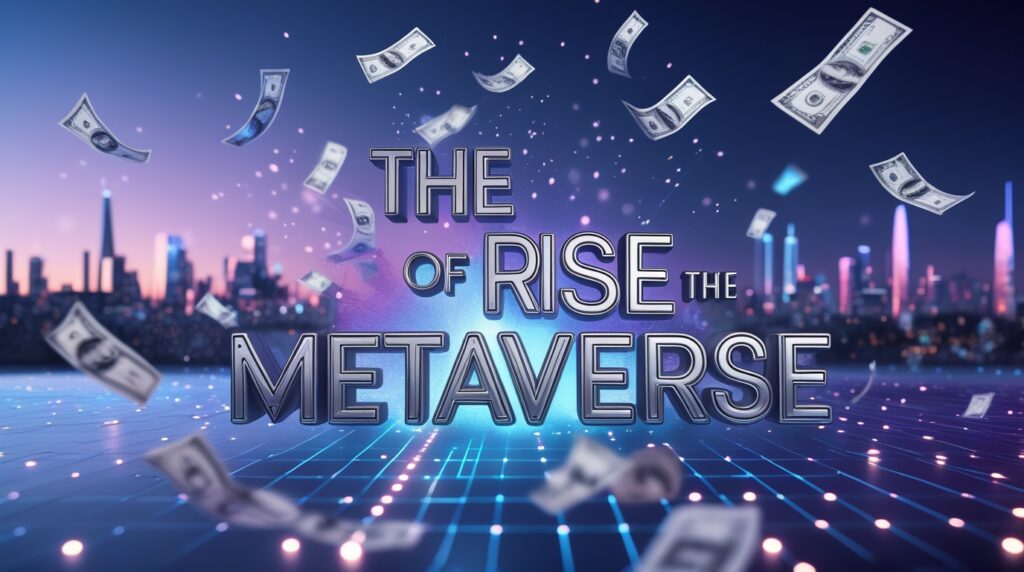The Rise of the Metaverse: How to Monetize Virtual Real Estate and Digital Assets

The metaverse is no longer a concept confined to science fiction—it’s a rapidly growing digital universe where people live, work, play, and trade. With the convergence of virtual reality (VR), augmented reality (AR), blockchain technology, and non-fungible tokens (NFTs), the metaverse is becoming a lucrative playground for entrepreneurs, investors, and creators. One of the most exciting opportunities in this space is the monetization of virtual real estate and digital assets.
In this article, we’ll explore how you can buy, sell, and trade virtual properties and NFTs in the metaverse, and turn these digital investments into real-world profits. Whether you’re a tech enthusiast, a gamer, or a savvy investor, the metaverse offers endless possibilities for financial growth.
What is the Metaverse?
The metaverse is a collective virtual shared space, created by the convergence of virtually enhanced physical reality and physically persistent virtual reality. Think of it as a fully immersive internet where users can interact with each other and digital objects in real-time. Platforms like Decentraland, The Sandbox, and Roblox are leading the charge, offering users the ability to own, develop, and monetize virtual land and assets.
Why Virtual Real Estate and Digital Assets Matter
In the metaverse, virtual real estate refers to parcels of land in digital worlds that users can buy, sell, and develop. These properties can be used for anything from building virtual homes and businesses to hosting events and creating interactive experiences. Digital assets, on the other hand, include NFTs, virtual goods, and in-game items that hold real-world value.
The value of virtual real estate and digital assets is driven by scarcity, utility, and demand. Just like in the physical world, prime locations in the metaverse—such as areas near popular virtual landmarks or high-traffic zones—can command premium prices. Similarly, unique or rare digital assets can fetch significant sums in online marketplaces.
How to Monetize Virtual Real Estate and Digital Assets
1. Buying and Selling Virtual Real Estate
Virtual real estate is one of the most straightforward ways to make money in the metaverse. Platforms like Decentraland, The Sandbox, and Somnium Space allow users to purchase land using cryptocurrencies. Once you own a piece of virtual land, you can develop it, rent it out, or sell it for a profit.
Steps to Get Started:
- Research popular metaverse platforms and their land marketplaces.
- Set up a digital wallet and acquire cryptocurrency (e.g., Ethereum or MANA).
- Purchase virtual land in high-demand areas or emerging neighborhoods.
- Develop your land by building virtual stores, galleries, or experiences to increase its value.
Monetization Strategies:
- Flipping: Buy undervalued land, hold it, and sell it when its value appreciates.
- Renting: Lease your land to businesses or creators for events or advertising.
- Developing: Build and monetize virtual experiences, such as games, concerts, or shopping malls.
2. Trading NFTs in the Metaverse

NFTs are unique digital assets that represent ownership of virtual items, such as art, collectibles, and in-game items. In the metaverse, NFTs can be used to buy and sell virtual real estate, avatars, clothing, and more.
Steps to Get Started:
- Explore NFT marketplaces like OpenSea, Rarible, or Foundation.
- Purchase NFTs that have utility in the metaverse, such as virtual land deeds or wearable items.
- Trade NFTs on secondary markets to capitalize on price fluctuations.
Monetization Strategies:
- Investing: Buy NFTs with potential for long-term value appreciation.
- Creating: Design and mint your own NFTs, such as virtual fashion or artwork.
- Trading: Buy low and sell high on NFT marketplaces.
3. Hosting Virtual Events and Experiences
Virtual real estate can be used to host events like concerts, conferences, and gaming tournaments. These events can attract large audiences and generate revenue through ticket sales, sponsorships, and in-app purchases.
Steps to Get Started:
- Acquire a piece of virtual land in a high-traffic area.
- Partner with event organizers, artists, or brands to host events.
- Use VR or AR technology to create immersive experiences.
Monetization Strategies:
- Ticket Sales: Charge attendees for access to your event.
- Sponsorships: Partner with brands to sponsor your event.
- Merchandising: Sell virtual goods or NFTs related to the event.
4. Building and Selling Virtual Goods
In the metaverse, users can buy and sell virtual goods like clothing, furniture, and vehicles. These items are often represented as NFTs and can be used to customize avatars or enhance virtual experiences.
Steps to Get Started:
- Learn 3D modeling and design tools like Blender or Unity.
- Create unique virtual goods that appeal to metaverse users.
- List your items for sale on NFT marketplaces or in-game stores.
Monetization Strategies:
- Direct Sales: Sell your virtual goods for a profit.
- Royalties: Earn royalties every time your NFT is resold.
- Licensing: License your designs to other creators or brands.
5. Advertising in the Metaverse
As the metaverse grows, so does the potential for advertising. Brands are eager to reach metaverse users through virtual billboards, sponsored events, and in-game ads.
Steps to Get Started:
- Purchase virtual land in high-traffic areas.
- Build digital billboards or branded experiences on your land.
- Partner with brands to create targeted ad campaigns.
Monetization Strategies:
- Ad Revenue: Charge brands for ad space on your virtual property.
- Sponsored Content: Create branded experiences or events.
- Affiliate Marketing: Promote products and earn commissions on sales.
6. Creating and Monetizing Virtual Businesses
The metaverse is home to a growing number of virtual businesses, from virtual fashion boutiques to digital art galleries. These businesses can generate revenue through sales, subscriptions, and memberships.
Steps to Get Started:
- Identify a niche market in the metaverse, such as virtual fashion or gaming.
- Build a virtual storefront or business on your land.
- Promote your business through social media and metaverse communities.
Monetization Strategies:
- Sales: Sell virtual goods or services to metaverse users.
- Subscriptions: Offer premium memberships or exclusive content.
- Partnerships: Collaborate with other creators or brands to expand your reach.
Risks and Challenges
While the metaverse offers exciting opportunities, it’s not without risks. The value of virtual real estate and digital assets can be volatile, and the regulatory landscape is still evolving. Additionally, the technology is relatively new, and platforms may face technical issues or competition.
To mitigate these risks:
- Do thorough research before investing in virtual real estate or NFTs.
- Diversify your investments across multiple platforms and assets.
- Stay informed about industry trends and regulatory developments.
The Future of the Metaverse
The metaverse is still in its early stages, but its potential is enormous. As technology advances and more people join the virtual world, the demand for virtual real estate and digital assets will only grow. By getting in early, you can position yourself to capitalize on this emerging market and build a profitable portfolio in the metaverse.
Final Thoughts
The rise of the metaverse represents a paradigm shift in how we interact with digital spaces. Virtual real estate and digital assets are at the forefront of this revolution, offering unprecedented opportunities for monetization. Whether you’re buying land, trading NFTs, or building virtual businesses, the key to success lies in creativity, innovation, and adaptability.

As the metaverse continues to evolve, those who embrace its potential will be well-positioned to thrive in this new digital frontier. So, take the plunge, explore the metaverse, and start monetizing your virtual dreams today!






